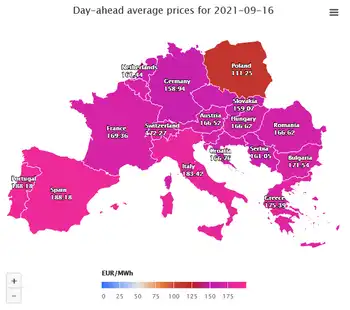Michigan to offer tax credits for battery R&D
By Associated Press
NFPA 70e Training - Arc Flash
Our customized live online or in‑person group training can be delivered to your staff at your location.

- Live Online
- 6 hours Instructor-led
- Group Training Available
The Democrat signed the bill at the North American International Auto Show in Detroit, saying the incentives could bring thousands of jobs to Michigan by encouraging companies to invest here in developing, manufacturing and assembling the advanced batteries at the heart of next-generation electric vehicles.
"We will be leapfrogging over other states," Granholm said. "We want Michigan to be positioned as the battery capital of the world."
The state Legislature passed the bill before adjourning last month. State officials say the United States today has no large-scale production plant for the lithium-ion battery, the technology General Motors Corp. expects to power its much-touted Chevrolet Volt. Most battery technology is being developed in Asia.
GM announced earlier that it will import lithium-ion cells for the Volt and other vehicles from LG Chem Ltd. of South Korea and assemble the batteries in a factory somewhere near Detroit.
The battery tax incentives approved by Granholm are similar to those offered the film industry last year. To entice moviemakers to choose Michigan over competing states, Granholm and legislators created refundable tax credits for in-state movie production expenses.
Giving tax breaks is nothing new, with the state often deciding to forgo tax revenue in exchange for economic investment and job creation. But refundable credits go further. They are more like a rebate for production expenses and can require the state to cut checks to businesses if the credits exceed their tax liability.
Despite the potential cost of the tax credits at a time of national recession and high statewide unemployment, Granholm said, investing in renewable energy and other strategic sectors is vital to ensure Michigan's long-term economic health.
"We can afford it because we can't afford not to do it," she said.
The governor toured the auto show for almost two hours before the signing ceremony, visiting exhibits for both domestic and foreign automakers and encouraging company executives to invest in Michigan.
She pulled up to the curb outside the Cobo Center convention hall in a demonstration battery-powered vehicle built on a Ford Focus platform and praised the wide range of electric and other alternative vehicles on display.
"This show is a game-changer for Michigan... because it is all about electric vehicles and the battery technology," Granholm said.
She also took time to admire the vehicles on display, complimenting the redesigned 2010 Ford Taurus as "beautiful" as Ford Motor Co. Chief Executive Alan Mulally gave her a tour of the automaker's exhibit and declaring herself "not worthy to sit in" a cherry-red 2009 Lexus IS 250C convertible.
Granholm hopped over a barrier at one point to get a closer look at a lime-green Chevy Spark subcompact, exclaiming, "I love this!"
Unfortunately for the governor, the model's doors didn't open, so she didn't get a chance to sit inside the three-door hatchback, which was called the Beat when GM unveiled it as a concept car in 2007.











